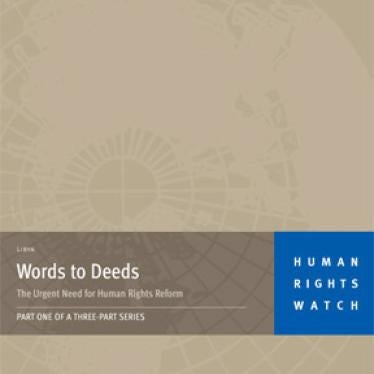As Libya emerges from long-term international isolation, the government has taken some important steps to improve human rights, including the recent release of 14 political prisoners. But the Libyan government continues to hold political prisoners, conduct unfair trials, and severely restrict free speech and association, Human Rights Watch said in a report released today.
“We welcome Libya’s first steps toward reform,” said Kenneth Roth, executive director of Human Rights Watch who visited Tripoli this week to present the government with the report. “But the government has a long road to travel before it meets the international standards of human rights.”
Despite improvements, the government continues to violate fundamental human rights Human Rights Watch says. It bans non-sanctioned political groups, independent media and genuine nongovernmental organizations. It has arrested peaceful government critics and detained them in violation of Libyan and international law, sometimes using torture to extract a confession. The fate of many political prisoners remains unknown.
But the government has in recent years improved prison conditions and closed a special court that unfairly sentenced those seeking peaceful political change. It has allowed international human rights organizations, including Human Rights Watch, to conduct fact-finding missions and advocacy in the country.
The 84-page report, Words to Deeds: Libya’s Urgent Need for Human Rights Reform is based primarily on Human Rights Watch’s first-ever trip to Libya, made in mid-2005, which the organization praised as a welcome step towards transparency. The authorities provided access to a wide range of high-level officials, as well as police stations, an immigration detention center and five prisons, where 32 prisoners were interviewed in private. However, government guides escorted Human Rights Watch researchers at all other times and controlled unauthorized contact with Libyans and foreigners in the country.
This week Human Rights Watch returned to Libya to present the report. The government announced to Human Rights Watch the release of the 14 prisoners, listed below, who had been convicted for activity in two banned organizations.
“We spoke openly with the Libyan government about our concerns,” said Roth. “We disagree on many substantive issues, but they are willing to listen and discuss.”
Libya’s fundamental laws enshrine many basic rights, but legislation restricting free speech and assembly are jarringly at odds with international human rights norms, Human Rights Watch said. Most notably, Law 71 bans any group activity based on a political ideology opposed to the principles of the 1969 al-Fateh Revolution, which brought Libyan leader Mu`ammar al-Qadhafi to power.
The most prominent political prisoner is Fathi al-Jahmi, who strongly criticized al-Qadhafi in interviews with international media in March 2004. The Internal Security Agency held him without trial until December 2005. He is now on trial in Tripoli’s criminal court for spreading misinformation, insulting al-Qadhafi, and unlawfully communicating with foreigners against the interests of the state.
The government continues to imprison 86 members of the Muslim Brotherhood, a political and social organization that eschews violence and a court sentenced the two leaders of the group to death. In a positive development, the Supreme Court in October 2005 overturned the verdicts of the 86 men and ordered a retrial. A verdict is expected on January 31. Human Rights Watch interviewed Fathi al-Jahmi and the Muslim Brotherhood leaders for the report.
Torture remains a serious concern. The government has criminalized torture and repeatedly claims that it investigates and prosecutes cases in which torture is alleged. Nevertheless, 15 out of 32 individuals Human Rights Watch interviewed in Libyan prisons for the report—political prisoners and common criminals—said security forces had tortured them during interrogations, usually to extract a confession.
During meetings with Human Rights Watch this week, the government said it had prosecuted 48 members of the security forces for allegedly using torture in 2004. The government did not say how many of these people were convicted, nor did it provide numbers for 2005.
The most well-known allegation of torture comes from the five Bulgarian nurses and one Palestinian doctor sentenced to death for allegedly infecting 426 Libyan children with HIV. Four of the foreign health workers told Human Rights Watch that interrogators had subjected them to electric shocks, beatings to the body with cables and wooden sticks, and beatings on the soles of their feet. In another positive development, the Supreme Court overturned the death sentences in December and granted the defendants a new trial.
The government strictly controls the media, Human Rights Watch said. There are no private radio or television stations, and government authorities publish the country’s main newspapers. The only sources of uncensored news are satellite television programs and the Internet, both of which have proliferated in Libya in recent years. The government has occasionally blocked some Internet sites, and in 2005 it prosecuted an Internet writer, `Abd al-Raziq al-Mansuri, apparently for his critical writings; he received a one-and-a-half year sentence for the illegal possession of a handgun.
The report also traces Libya’s international rehabilitation over the past five years. The United States and European governments are drawn to Libya’s oil wealth and al-Qadhafi’s strategic cooperation in combating terrorism. They criticize Libya’s human rights record at times, but they rarely let their concerns impede fast-growing security and economic ties.
“As western governments improve relations with Libya, they should press the government to improve its respect for human rights,” Roth said. “Libya’s cooperation in fighting terrorism should not mean carte blanche to commit abuse.”
From the al-Ahli Football Club – pardoned by the Supreme Council for Judicial Authority on October 25, 2005:
- al-Sherif Moftah al-Amami
- al-Fitory Abdel Rehim Qarqum
- Rabea Khaled al-Seayti
- Soliman Saad Abd Rabbo Nejm
- Abdel Salam Daw al-Mazoughi
- Mohamed Ramadan al-Amami
- Ahmed Abdel Salam al-Sherif
- Ahmed Mohamed al-Zalawi
Released due to health concerns by the Secretary of the General People’s Committee for Justice on January 6, 2006:
- Moftah al-Jali Abdel Wanis al-Mezeini
- Awad Mohamed Saad al-Orfi
- Ahmed Mohamed Ibrahim Zaed
- Mousa Abdallah Saleh al-Shaeri
- Salah Saeid Younis Khazzam
- Ahmed Aly Abdel Hamid al-Khafifi







